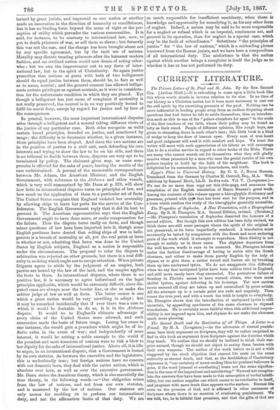—Mr. Plumptre's translation of Sophocles deserved the honours of a
second edition. But though this new edition has been fully revised, we think there are still some passages where the spirit of the original is not preserved, or its force imperfectly rendered. A translation must necessarily be tested by comparison with the finest and most enduring parts of the work which it attempts to reproduce. Mere fidelity is not enough to satisfy us in those cases. The slightest departure from the well known words is sure to be resented. Mr. Plumptre labours under the further disadvantage of having to strive with the Greek choruses, and either to make them purely English by the help of
rhyme, or to give them a rather forced and barren air by breaking them up into unrhymed lyrics. We do not exaggerate this difficulty
when we say that unrhymed lyrics have been seldom tried in England, and still more rarely have they succeeded. The portentous failure of Southey in Thalaba seems to have warned others, who were more skilful lyrists, against following in his footsteps. Yet new metres never succeed till they are taken up and naturalized by great artists. All the attempts up to a certain point are rode and ungainly. Then comes the true poet, and with a touch the trick is taught to everybody. Mr. Plumptre shows that the introduction of unrhymed lyrics is still uncertain, by appending specimens of the same choruses in rhymed translations. He is certainly more faithful when this additional respon- sibility is not imposed upon him, and rhymes do not make the choruses much more pleasing.






























 Previous page
Previous page